Tuesday, 1 September 2015
test footage from the re-blown firmware of the Lumix GH1 (DSLR camcorder build - Part 3)
Here's a first test of the modified camera.
I wanted to check that the autofocus could be used as well as manual focus. The key part of this test is check that the focus changes will create a suitably blurred depth of field, which is not what you get from many regular camcorders. It seems to be working.
Next I'll try some footage to a better SDHC card, so that I can crank up the speed of the output. I'd like to shift from the 17 Megabit/second peak of the standard GH1 to closer to 50Mb/s.
I have't manually adjusted exposure or ISO yet, but I want to know that I'm getting the right shutter speed for video (The 180 degree rule etc).
Then I'll be looking for some sort of focus puller mechanism to support manual focusing properly and a few bits and pieces so that I can build it into a rail and cage system. And an external microphone, I suppose.
The orange box in the video seems to contain some rudimentary components that might be useful.
I realise that this camera is already a few years old, but it's fascinating to quickly make it into something dedicated and still useful. And, if it works, the body is still updatable and the lenses and other bits will still work.
Monday, 31 August 2015
Changing the Lumix GH1 firmware (DSLR camcorder build - Part 2)
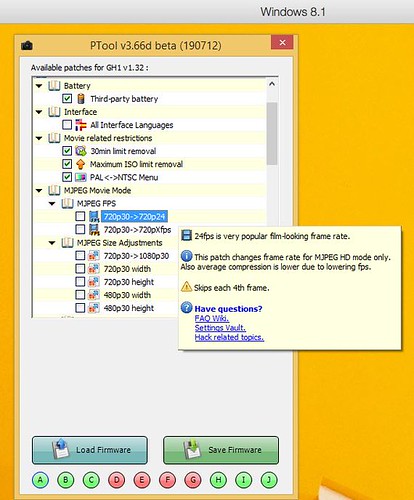
To modify the Lumix GH1 firmware, I've downloaded the Ptool utility.
It's a Windows exe, so I've had to run it in a Parallels session on the iMac (I'd forgotten just how quickly Windows 8 Parallels boots as a session on my iMac).
The basic approach is to take the standard firmware image for the camera and the use Ptool to edit appropriate settings. There's a wide variety available (with handy hints) as well as some pre-defined sets contributed by other people.
I've defined my own set, which at this stage are fairly conservative. The (at your own risk) process steps are:
- Download Ptool to a PC.
- Download a copy of the latest Panasonic Firmware to the same PC.
- Use Ptool to modify the firmware image on the PC.
- Create a new firmware image, which must then be copied to an SDHC card in the root directory.
- Put the SDHC card into the Lumix GH1.
- Start the camera and then press the play button.
- Follow the prompts to update the firmware.
My next step is to try the change with some video recording...
refreshing an old Lumix GH1 for FHD video (DSLR camcorder build - Part 1)

I've been using some video equipment recently as part of the Mixtape sessions and it got me thinking about ways to create a dedicated DSLR rig that could go alongside the Canon system that I normally use.
In practice, many DSLRs have video capabilities nowadays, and my routine use of Olympus OM-D EM cameras means that there is always a video capability available.
For this experiment, I want to make the camera dedicated for video, perhaps squeezing some more bit-rate from it than conventional. I guess it's a form of overclocking. The most well-known modifications are to Canon 5D II and III DSLR - mainly adding new menus for things like sound levels and exposure metering.
My preference was to do something with a micro 4/3 system. The cameras don't have lock up mirror to worry about and the type of sensor doesn't have the same heating issues as, say, a Canon.
I've selected an old Lumix GH1 body for the adaptation. The GH1 has plenty of form for being hacked, the most well known being via the work of Vitaliy Kiselev, who developed a firmware utility called Ptool which takes the Lumix firmware image and allows modification of various parameters.
That also explains why I'm using an old camera body for the experiment - this could all go horribly wrong. Actually, there's copies of the Lumix GH1 on eBay for around £100 now, whilst the similar form factor but progressively improved Panasonic Lumix GH2, GH3, and GH4 go up in price as £250, £400 and £900. I'm guessing the GH5 will appear early next year at around £1000.
The latest GH4 can record 4K video, but I'm happy enough to create something that will run with FHD (Full HD which is 1920x1080 pixels). It's still more pixels than many of the non-huge televisions use and won't look too out of place alongside my conventional HD camcorder images. To put it in context, a conventional 25 frame per second PAL DVD is 720 × 576 pixels per frame.
By using a micro 4/3 I can easily try a variety of lenses, including my old manual OM Zuikos. This could be quite entertaining and create a wide kit of parts for almost no outlay.
I'm also interested to create the finished object with more of a film camera appearance rather than looking like a stills camera, so I'll be looking for some cheap Meccano-like parts to be able to dress the finished item. It was amusing filming some of the Mixtape sessions and to get reactions about having a 'proper camera' when using the relatively modest Canon XF system. For this one I'm thinking matte box and camera cage.
But, first things first. I'll need to re-blow the firmware in the camera...
Sunday, 30 August 2015
A few Mixtape @ukmixtape observations from #edfringe

Well.
The month of Mixtape in Edinburgh has reached an end and all the various aspects are returning to normal. I decided not to write about the specifics of the show whilst it was running, but I'll probably add a few posts now its all done and dusted.
- Was it a success? Undoubtedly.
- Did it make a profit? No, but we didn't expect it to. 'Break even' would be an exaggeration, but it's not a deep loss.
- Was it enjoyable as an experience? Absolutely
- Did the audience like it? Most people thoroughly enjoyed it
- Was it hard work? Oh yes
- Would we do something like it again? Probably...
It's one of those immutable laws, that certain things will happen and however much you try to dodge them, they'll catch you in the end. However, the 'once bitten' adage also applies, so after whatever it is has happened, there's a new layer of experience to draw upon.
So one aspect of Mixtape was the daily marketing and advertising. This needed to be a blend of traditional flyering, critics, meet the media, stage appearances, reviews and the modern techniques of social media such as Facebook, Instagram, Twitter and on-line advertising.
Whether traditional or newer methods, there's still a learning curve. Unlike in mainstream theatre venues, there's no chance that the show will have a regular or previously cultivated audience. It's a new gig every night and with a fresh group of new generally show-savvy audience, who have somehow picked this show from 3,300 others. Being a 10.20PM start show in a venue serving drinks until 5.00AM every morning, there's some *ahem* demographics to consider as well.
Mixtape also had a large venue. One of the larger Underbelly sites and we couldn't help notice that many other shows we visited were in much smaller locations (except for, say, Camille O'Sullivan - where we had numbered seats or that show about Jimmy Savile which was a West End transfer and had a large venue).
Frequently we noticed that other peoples' venues were 30 or 40 seaters, which Mixtape would have easily sold out almost every night. But with a bigger venue there's more vagaries to contend with. Mixtape did manage sell-out, but actually a 2/3 full venue was somewhat more comfortable.
There was also a great choice of shows even in the Underbelly Cowgate. Just in the 21.00-23.00 slot there were 16 shows to choose from, as can be seen on partial billboard behind some of the cast.

We used a fairly wide range of channels to get the audience. It included:
- The preview show - This was run a week or more before the Fringe and sold out in its own right. This also generated some good preview press.
- A small kick-starter style fundraiser. - A good idea although the rules of the particular site created a few problems and a different approach would be used if this was considered again.
- The programmes for the show. - Kind of mandatory, we advertised in the main Edinburgh Fringe Programme (Page 141), the Sunday Times special one covering the Big Four venues and the Underbelly's own booklet.
- The advert boards at the venue - Various sizes and sprinkled around. Of course, everyone else does this too, so there's still a challenge to be noticed.
- The flyers - We produced them and handed them out around Edinburgh. These took some work to produce but seem to be well-received. Its debatable whether giving them to everyone we see really worked and most of the time the hand-out is more selective.
- The wristbands and tote bags - These were used as part of the Press pack and as small handouts to potential audience in Edinburgh. They raised awareness and created a buzz with people tweeting them as selfies and similar.
- The use of reviewers - This was both professional and personal. A tough call when there's 3,300 shows with many well-known people to view as well as many shows funded by theatres or other groups with better access to P.R. Realistically, there's plenty of shows with 'known' writers and produced by 'known' groups which get first dibs.
- The use of twitter - Twitter was used to further promote the show. This has included cast and the production team producing a range of messages throughout the day to raise awareness. It relies on people using #edfringe and other similar hashtag lists as part of their Edinburgh experience, but suffers from the incredibly fast turnover of tweets meaning anything about the show is only 'on top' for a few seconds.
- The used of Facebook and Instagram - Similar to above, except there's a greater requirement for people to seek out the show information in the first place.
- Online advertising - We found some less expensive sites where we could insert some advert blocks on rotation.
- Radio interviews - A few radio spots, both before the Fringe started and then a couple of top-up slots during the Fringe. There was some telly as well, but we don't think any of it got screened.
We always had some bookings in advance, and with the benefit of hindsight we can see that the volume of bookings created a fairly steady rolling average as the days moved along. We could predict our 'average number per day' and throughout the run watched it progress upwards towards a respectable level.

There's plenty more to say, but I think this post already runs on long enough. Expect more ;-)
Thursday, 27 August 2015
in the thick of a deep media review

A spin-off from the Edinburgh Fringe this year has been the side events taking place. No, that's the wrong way around isn't it? The Fringe is supposed to be the side event for the main Festival.
Anyway.
Yesterday evening it was the MacTaggart lecture at the EICC, which is part of the Edinburgh Television Festival. Armando Iannucci gave the talk, which is a plea about the need to defend the UK television industry. I'm with him on this one.
As an example, instead of getting a bunch of Establishment interests to review the Beeb, there needs to be another way. I understand the use of the experts chosen, because they can ensure the *ahem* right paths for their relevant interest. In Iannucci's words:
"I see executives, media owners, industry gurus, all talented people; but not a single person who’s made a classic and enduring television show, not a presenter, a writer, director or creative producer, no Moffat or Wainwright or Mulville or Mercurio..."
Maybe the production side is better represented? Iannucci again:
"...nor do I see anyone from our world-class post-production industry or from design or drama, no-one from the enormous world-beating service of day-to-day production, to give their views, to offload their expertise on the difficulties and the joys and the challenges of making world standard public service broadcasting."
Come to think of it, there's no regular viewers represented either. I notice Whittingdale has asked to see Iannucci this morning. We have to hope this is not some kind of reflex tokenism.
And it's bonkers to say that the Beeb shouldn't do web or multi-channel multi-platform. The whole premise of media is now skewed exactly to these varied demands.
Britain has major soft power in the world, with global influence driven through its culture, media and education. The Beeb and UK Television is a significant part of this non-weapons-system.
That doesn't stop the creeping ambition of the imperial elite who drive artificial outrage towards the BBC. This political agenda spin is towards capitalising yet more of Britain away to offshore interests. Cameron won't admit that there's people whispering in his ear, but I still remember that Jeremy Hunt situation around the BskyB bid in 2012. Enough said?
And I can't help noticing, that for every person wanting to defend the UK media industry, there seems to be several saying abolish the licence fee and so on. There's wider repercussions than the 45p per day cost of BBC telly, radio and internet throughout the land.
Here's a copy of Armando Iannucci's well articulated speech.
Wednesday, 26 August 2015
Arca Swiss for the free tripod

That tripod I took to Edinburgh didn't have the same clippy-in bit as my other ones.
The plate that goes on the camera is unique to the tripod. Actually, most tripod makers seem to have had a go at keeping their systems unique, until a system that originated in Switzerland has gradually crept in.
In fairness, the tripod was a free gift, and has now done a good job at the Festival. To keep things simple with my cameras, I decided to Arca Swiss-ify the tripod, so that it used the same type of plate I normally use.
It sounds basic, but it means that if a camera has a plate on its base it can clip into any tripod that has the same system clamp. Otherwise Quick Release is a misnomer because of forever looking for baseplates that match.
Arca Swiss is a well-known system in some circles and a 'Fairly Quick Release' system. The required components are robust CNC-machined aluminium and available widely (and at widely varying prices) around the internet.
It takes about 1-2 seconds to put in or remove a camera from a stand. I prefer this to the other spring loaded quick release which take half a second, for one basic reason. The camera and whatever else is clamped needs to be secure and only come out when required. The Arca system with its twist fitting to me is safer, whilst some other systems can be pinged and the camera can fairly leap from the tripod. Not always good.
So I found another Arca Swiss clamp and have installed it into the Velbon tripod. Curiously, it makes the whole tripod look more industrial strength, although it still needs some care in use.

Some would say this is over-engineering, but I can now disable the normal quick release and convert this interim tripod to the same system as the others. Increasingly handy nowadays as more cameras are video enabled.

Not bad for a freebie.
Monday, 24 August 2015
why the September spiders are a week early

Picture from Damian Barr's tweet - I like the nice touch of the wine listing.
I usually associate September with indoor spiders. Sure, there might be one or two tiny ones that get inside before that, but September brings out the big ones.
You know the kind of thing. You can hear them as they walk across the floor. They have a surprising turn of acceleration too, and although large, can squinch down small at the approach of a glass tumbler in which they can be captured.
It's strange too. In the garage, there are usually a whole range of spiders which only very occasionally do anything to startle. We keep a kind of balanced equilibrium there between two-legged and eight legged creatures.
Indoors is a whole different thing. It's usually my job to spot a spider and capture it without alerting anyone else. If I do there's a kind of short-term mayhem until the beastie is contained and then expelled.
I usually throw them into a bush or small tree near to the front door, but in the case of the recent large ones, I've taken them to the bottom of the back garden and released them far enough away to give them a completely different playground.
So why, this year, are they a week or two early?
My sceptical side would say that the media needs a story to fill a quarter page and spiders are a safe bet.
That would be so if I hadn't also seen two early monster arachnids indoors here over the last week or so. Maybe they have heard that the academic terms have been brought forward?

This one from a tweet by Lewis Gibbs - no wine listing on this picture
Of course, the ones I've evicted were AT LEAST as big as the ones in the pictures.
Oh yes.
Sunday, 23 August 2015
The rumoured real reason for the One Direction split

One Direction claim to be the most successful band since The Beatles, at least based upon record sales.
I don't actually own any One Direction music, although I borrowed the lyrics from 'Drag me down' to write a Riverside Detectives track for Mixtape - yes - dragging the lake, Elvis Costello style.
I've also stayed in the same hotel in Barcelona as Louis Tomlinson, during some of his own recent rumour sessions.
Complete with the impressive gangway of teenagers watching the entrance to the hotel and the few that managed to sneak past the security cordon to the inside. I wondered at the time whether Louis would simply use the downstairs entrance via the car park instead of the main entrance lobby doorway. I suppose it is a celebrity thing?
The media reports that the success of One Direction is based partly on their use of social media, with millions of fans following each of the band.
Curiously, twitter isn't the automatic choice for teenagers with, instead, Facebook, Instagram and even Snapchat getting higher coverage.
The number one social media appears to still be person to person texting although I suspect WhatsApp would get a higher placing in any new survey.

Our marketing for the show in Edinburgh Fringe uses a mixture of the social media to generate interest. In a modest way, it's working for us, so I suppose the scale for One Direction to their Directioneers must enormously magnifies that type of effect.
As for the not-so-secret rumour: If 1D members have really amassed £45m each, then I guess they can realistically take time out to individually pursue sola careers.
For the Svengalis operating them, it also keeps the odds good for the future. Insulate current turmoil via solo projects and then promote a comeback tour.
Kerching.

As the female detective said to the male detective in the lyric rework: "Nobody can drag me down."
And yes. Tickets for Mixtape at #edfringe are still available: Underbelly and Edfringe office
Friday, 21 August 2015
featherweight tripod to the rescue

Amongst the Edinburgh Fringe stuff has been a small amount of video activity. Mainly recording a couple of shows as a sort of 'Archive'.
Practicalities for this Edinburgh trip means that I've been using a budget Velbon tripod which is mostly made from plastic. It's something that fits into a carry-on holdall that can go in an overhead locker. I did have a lightweight Manfrotto that I'd originally planned to use, but curiously about 5 of the leg clips on it had mysteriously fractured.
This stand-in tripod does have a small amount of metal in its leg construction, but the head, clamp, leg braces, winding mechanism and centre column are all plastic with a few lightweight bolts to hold it all together. Consequently it weighs almost nothing and takes up less space and weight than even my Giottos Monopod, which looks quite brutish by comparison.
I've treated it with great care (I like to think I also did with the disintegrating Manfrotto*) and with this one there do seem to be a number of obvious points that could break or bend rather easily.
The lightweight plastic head has a sort of swivel control and various other plastic taps to turn to adjust tilt. The trick is to turn everything very slowly.
Surprisingly, it has worked fairly well for basic video gathering. Admittedly I was using a fairly lightweight camera without too much attached to it, which probably helped. And it was mainly pointed and locked pointing in one direction.
Considering it was a free gift with a magazine subscription, I'll declare victory.
* My theory with the small Manfrotto tripod was that I left it in the car during all weathers and the changing temperatures caused the clips to crack.
Wednesday, 19 August 2015
A small sample of ways to negotiate the #edfringe Royal Mile

The Royal Mile eventually leads up to the Edinburgh Castle, after maybe a diversion onto the Whisky barrel tour.
At this time of year there's plenty of modes of Royal Mile transport on display.
We get fancy cars (though only a few dare attempt the largely road blockaded area).

Then there's the rickshaws (although I expect they have another name (or two!) in Edinburgh.

Of course, theres always a scenic way to head along the Mile, maybe dancing?

And some will just stop to busk for a while.
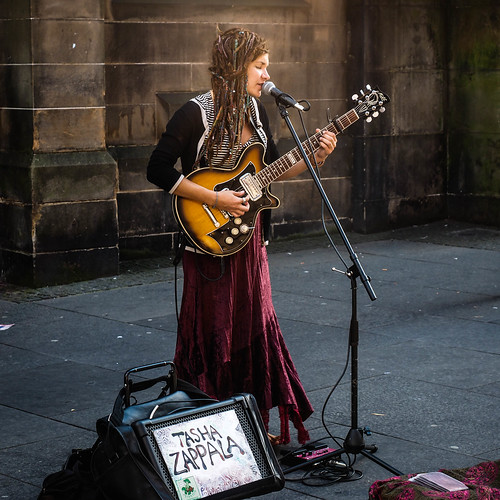
...or maybe even conjure a magic trick or two? I still don't know how he made the stick disappear.
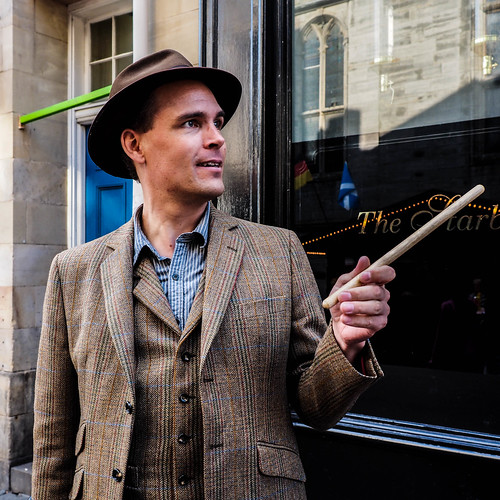
Some will attempt to blockade the path with banners.
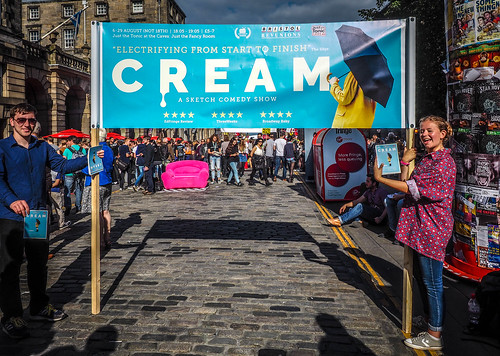
...or stand somewhere prominent to give the thumbs up. Notice the ever ready flyers.

And the Mixtapers will happily perform on one of the Royal Mile's special small stages as part of promotion.
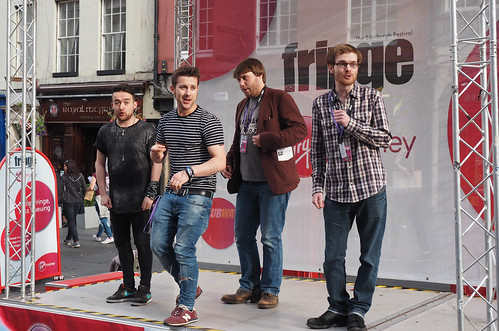
Phew.
Monday, 17 August 2015
where is my mind? (#edfringe @ukmixtape @FollowTheCow)
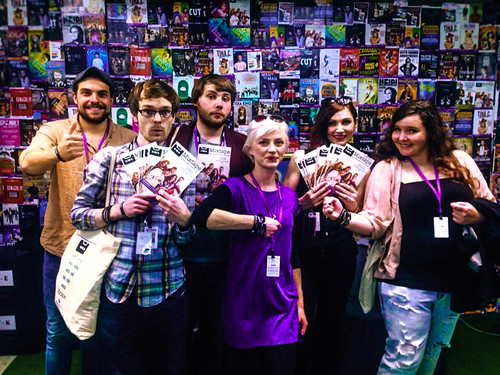
I've been to the Fringe a few times, but the direct connection with the show creates whole other dynamics. There's so much to do beyond the actual show time.
The first time was with Machinal and that really only involved being a member of the audience. It was in the Pleasance Courtyard in the days when the BBC used the same space for their broadcasts. Nowadays the Beeb has its own village with tents and even The One Show broadcasts from on-site.
Then Warhol at the (old) Bongo Club, when the following act was Mark Thomas who at the time had infiltrated the British arms industry and was showing how easy it was to buy arms for a dodgy dictatorship.
This time it's Mixtape at the Underbelly Cowgate, which is a seemingly subterranean set of vaults underneath Edinburgh Central Library. It's a very bustling venue with an entrance adjacent to the King George IV Bridge and another 4 storeys below in Cowgate.
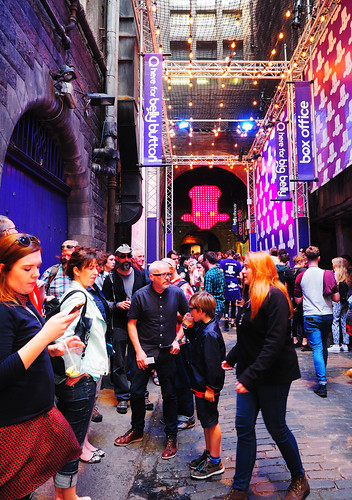
Between the 4 storeys are several performance spaces as well as at least three bar areas. Spiral stone staircases link most of it together.
In the evening it rocks and can be a bid mad as the varied shows start, generally spaced about ten minutes apart to manage the crowds of people coming in and out. At the Fringe? Underbelly Cowgate is a 'must experience' venue.
Understandably the venue itself is promotion neutral, so flyers are being handed out in the street below, or along the Royal Mile.
I've tried various Royal Mile walking techniques.

There's the busy person look - that doesn't yield any flyers except from absolute rookies. If I take a camera with a lens hood, I become part of the scene and then its easy to get shows to stop and pose for pictures. I don't get any flyers from this unless I ask. That's even for the shows that I snapshot.
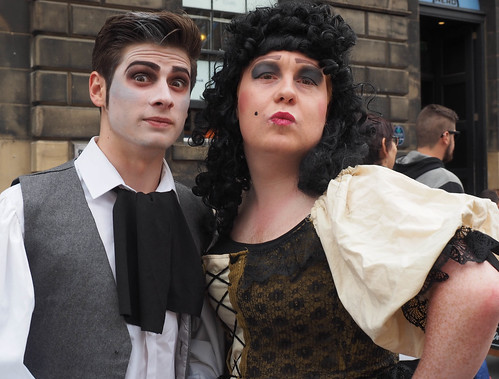
As an experiment I put the camera away, slowed my pace and walked back through an area I'd just visited. It was hilarious. I was flyered about 10 times in the first couple of minutes.
And then for my own flyering technique. My rules.
- Don't hand out flyers to just random passing people, prequalify in some way first.
- Always swap a flyer with anyone that offers one. They are usually genuinely interested in the Mixtape show.
- Ask the flyering person if they are in the show they are flyering. There are quite a few 'hired guns' just shifting leaflets for cash. I talked to one at length and she said she could shift about a 15cm stack of leaflets an hour.
- Identify people likely to be interested in Mixtape (various giveaway signs) and engage them in a short conversation.
- Stand around in prominent areas with the Mixtape tote-bag, logo and catchy saying visible. It's amazing how many people notice it. I've been asked to pose for photos with it.

Some ways to tell they would be interested.
- Specifically looking at adverts for shows.
- Several flyers in hand and smiling.
- Discussing flyers or show on the street.
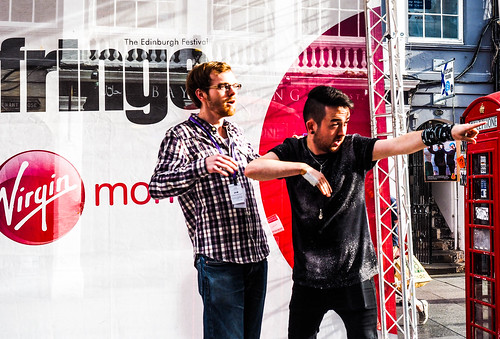
Of course, if Mixtape is performing on the Royal Mile stage then anyone is fair game, but otherwise its best to treat the flyers as a valuable item, requiring pre qualification before handout. And yes, we do have thousands of them.
Here's the Mixtape winners on stage collecting their Golden Mixtape from Saturday's sell-out show (crowdsourced photo)

Friday, 14 August 2015
An Illuminating Yarn at Space, Edinburgh

This time we were yarn-bombing at the Edinburgh Fringe. The show was in a rather posh venue within the Radisson Hotel, where the gin-and-tonics were a surprisingly robust price.
A charming little story set in Saltburn-on-Sea where mystery knitted dolls appeared on the pier. The two main characters Clare and Nina go out to take a look...
Knitted together by Jane Pickthall to provide social commentary as well as the main yarn, the two friends and a passing community watch officer make a surprising discovery.
It was a well-acted by the two main characters of Hannah Walker and Jill Dellow, and supported by Matt Howden as the patrolman. The script shines a torch on some aspects of British culture, the economy and unemployment, with the backdrop of the pier and the mysterious appearance of varied characters.
An enjoyable hour, featuring a simple premise with some sharp back commentary.
Subscribe to:
Comments (Atom)